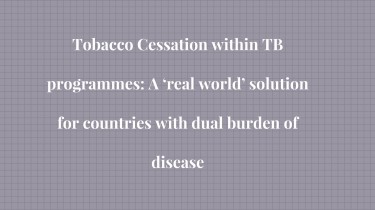Background
Tobacco smoking almost doubles the risk of acquiring TB infection. Moreover, the odds of developing active TB disease for smokers are twice those of non-smokers. Smoking also affects the dynamics of disease progression in individuals with latent TB; a strong association of active disease with smoking is seen among tuberculin skin test (TST) positive individuals, suggesting that smoking induces progression or reactivation in those infected with TB. Tobacco smoking also has profound effects on TB treatment outcomes. Smoking increases the risk of dying from TB, after adjusting for socioeconomic status. Smoking also leads to faster and more severe progression of pulmonary TB disease, with more cavity lesions and greater likelihood of hospitalization. Smoking increases the length of treatment needed to convert sputum culture from positive to negative in TB patients. Default or poor drug compliance among TB patients has also been associated with smoking.
The research is centered on three countries that have high incidence of tobacco use and high prevalence of TB, namely Bangladesh, Nepal and Pakistan. In Nepal, HERD International is implementing this study to reduce the burden of tobacco-related lung diseases. Our approach is to integrate tobacco cessation strategies into TB control programmes, which consists of different work packages/activities.
Goals and objectives of the program
The major objectives of this program is to reduce the burden of lung diseases in low-and middle-income countries (LMIC) by integrating inexpensive tobacco cessation strategies of proven efficacy (behavioral and pharmacological) into tuberculosis (TB) control programs.
Implementation activities
The program has been divided into different work packages for the ease of the implementation. HERD International has conducted following activities:
| Work packages | Activities |
| Work package 1. Development and feasibility | Selection of program implementation site Preparation of IEC materials Series of workshop with DOTS facilitators and stakeholders Expert panel group meeting Feedback collection from key personnel Finalization of IEC materials for behavioral support Training to DOTS facilitators Preparation of health worker’s guidelines Implementation of behavioral support activity in DOTS center’s Regular monitoring and follow up to the center’s |
| Work package 2. Process evaluation | Health workers interview Observation of health facilities Interview with patients |
| Work package 3. Context evaluation | Data collection from heath workers interview |
| Work package 4. Scale up and sustainability | Data analysis from DOTS centers Revision of IEC materials as per he learning and experiences from the field through workshop with DOTS facilitators Preparation of videos from health workers ongoing Preparation of desk guide |
Associated Team Members
Shophika Regmi
Senior Manager: Health System Research, Evaluation and LearningShophika Regmi
Senior Manager: Health System Research, Evaluation and LearningMs. Shophika Regmi has been working in health and social research for more than a decade. Throughout this period, she has led research projects of various natures and scales, particularly in the health sector. She possesses extensive experiences in implementation research using participatory action approaches, designing and executing evaluation studies, national level surveillance study, and large-scale survey across diverse areas such as health system strengthening, urban health, health workforce, non-communicable disease, nutrition, maternal health, etc. With a profound interest in [...]
Learn more
